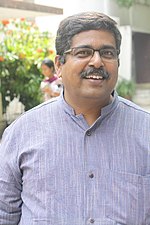Jogi (writer)
Jogi | |
|---|---|
 Girish Rao Hatwar (Jogi) | |
| Born | Girish Rao Hatwar 16 November 1965 Hosabettu, India |
| Pen name | Jogi |
| Occupation | Journalist, Kannada Prabha |
| Nationality | Indian |
| Genre | Short stories, Poetry, Novels, Columns, Criticism |
| Subject | Karnataka, Rural life, Urban life, Spirituality |
| Literary movement | Neo-literature |
Girish Rao Hatwar, popularly known as Jogi, is a Kannada writer and journalist.[1] Being one of the Kannada neo-literature writers, he has written short stories, novels and columns in many Kannada periodicals and daily newspapers. He has also written scripts for television serials, lyrics and screen play for movies. A journalist by profession, Jogi is currently a Magazine Editor of Kannada Prabha daily.[2]
Early life
[edit]Born in an agricultural family in Hosabettu near Suratkal in Mangaluru district, Jogi studied in Guruvayankere and Uppinangadi.[3] Elder brother Hatwar Narayana Rao made name in Karnataka rural folk world by writing Yakshagana episodes and as a narrator in Thala Maddale.
Jogi, who started writing at the age of 18, completed his B.Com. in Puttur. In 1989, as Girish Rao Hatwar, he came to Bangalore and was transformed as Jogi by the then editor of Kannada Prabha – Y N Krishnamurthy, popularly known as YNK.
Career
[edit]Jogi started by writing a column Bollywood 'Gha'sip in Kannada Prabha. He wrote a column called Ravi Kanaddu in Hi Bangalore, a Kannada weekly and later joined as its assistant editor. Jogi worked as editor of a monthly magazine Acchari. Jogi, Janaki, Girish Rao Hatwar, H Girish Rao, Sathyavratha Hosabeettu were some of his pen names and later worked as Associate Magazine Editor in Kannada Prabha. He gained popularity as movie and book reviewer and slowly started writing stories. Later, he started writing novels also.
Jogi wrote a series for young adults.[4] Titled as Life is beautiful, six books have been published under this series. His novel Ashwatthaman, which has a film actor as central character, has received positive reviews.[5]
Along with journalism and literature activities, Jogi wrote dialogues to Kannada television serials. Jogi wrote the script and dialogue of the movie Mouni, which is based on a novel by U. R. Ananthamurthy. Kaada Beladingalu written by Jogi was adapted as a movie and it bagged Karnataka State Film Awards 2006-07 in the categories of best social film and best story.[6]
Jogi's stories were published in Mayura, Taranga, Tushara, Sudha, O Manase magazines, as well as Kannada Prabha and Prajavani newspapers. He also wrote Essays to Lankesh Patrike in the name of H Girish. He used to write book reviews under pseudo names and was also in charge of Roopatara being published under Manipal group. As of 2022, he is working as Chief Magazine Editor of Kannada Prabha.
Jogi has started a literary group Half Circle in Club House.[7]
Bibliography
[edit]
Novels[edit]
Bengaluru Series[edit]
Story collections[edit]
|
Columns[edit]
Inspirational books[edit]
Play[edit]
Variety writings[edit]
|
Others
[edit]- Halage – Balapa (Lessons for new writers)
- Kathe, Chitrakathe, Sambhashane (Along with articles from 18 film directors)
- Edited a tributary under the name Bahuroopi Karnad post Karnad's demise; This is a collection of 37 articles by the who's who of Indian arts and literature[9]
Awards and recognition
[edit]- Karnataka State Award for Best Story for Film Kada Beladingalu[10]
- Vaddarse Raghuram Shetty Award for Journalism[11]
- Bangalore Literature Festival Book Prize for achievements in Kannada Literature, 2021[12][3]
- Sahithya Rathna[13]
- Sahityashri Award, Karnataka Sahitya Academy, 2021[14]
References
[edit]- ^ Nandakumar, Prathibha (23 December 2021). "Shhh... The writing machine is at work". Bangalore Mirror. Archived from the original on 10 January 2022. Retrieved 7 March 2022.
- ^ "Bangalore Literature Festival : ಬೆಂಗಳೂರು ಲಿಟರೇಚರ್ ಫೆಸ್ಟಿವಲ್ ಪ್ರಶಸ್ತಿಗೆ ಜೋಗಿ ಭಾಜನ". asianetnews.com (in Kannada). 18 December 2021. Archived from the original on 18 December 2021. Retrieved 7 March 2022.
- ^ a b Kalasad, Shridevi (16 December 2021). "Bangalore Literature Festival : 'ನಾನು ಪ್ರಶಸ್ತಿ ನಿರೋಧಕ ಲಸಿಕೆಯನ್ನು ಹಾಕಿಕೊಂಡೇ ಓಡಾಡುತ್ತಿದ್ದೇನೆ' ಕಥೆಗಾರ ಜೋಗಿ". tv9kannada.com (in Kannada). Archived from the original on 16 December 2021. Retrieved 7 March 2022.
- ^ Nandakumar, Prathibha (26 March 2016). "CREATING NEW READERS". Bangalore Mirror. Archived from the original on 10 January 2022. Retrieved 7 March 2022.
- ^ "ಜೋಗಿ, ಎ ನಾವೆಲ್ ಬುಕ್ ಸ್ಟೋರ್?". Just Kannada (in Kannada). 3 March 2020. Archived from the original on 10 January 2022. Retrieved 7 March 2022.
- ^ Robinson, Anna. "National Film Awards: Indian Cinema Controversies Outshine Winners". Archived from the original on 23 April 2019. Retrieved 7 March 2022.
- ^ "Many Bengaluru groups thriving on Clubhouse". Deccan Herald. Retrieved 10 January 2022.
- ^ "'ಸಾವು' ಹುಟ್ಟಿದ್ದು ಹೇಗೆ? ಗಿರೀಶ್ ರಾವ್ ಹತ್ವಾರ್ (ಜೋಗಿ) ಸಂದರ್ಶನ". Vijaya Karnataka. Retrieved 22 October 2022.
- ^ S R, Ramakrishna (25 July 2019). "Tributes to Karnad Compiled in book". Deccan Herald. Archived from the original on 2 December 2020. Retrieved 7 March 2022.
- ^ "Karnataka State Film Awards – 2006-2007". Alt Film Guide. Archived from the original on 31 August 2011. Retrieved 10 January 2022.
- ^ "Udupi: Girish Rao Hatwar to be presented Vaddarse Raghuram Shetty Journalism Award on Aug 5". Daijiworld. 3 August 2018. Archived from the original on 4 August 2018. Retrieved 7 March 2022.
- ^ "Atta Galatta Bangalore Literature Festival Book Prize 2021". Atta Galatta. Archived from the original on 11 January 2022. Retrieved 7 March 2022.
- ^ "ಕನ್ನಡಪ್ರಭದ ಜೋಗಿ ಸೇರಿ ಮೂವರಿಗೆ ಬರಹಗಾರರ ಸಂಘದ ಪ್ರಶಸ್ತಿ" (in Kannada). Suvarna News. 28 October 2021. Archived from the original on 10 January 2022. Retrieved 7 March 2022.
- ^ "Karnataka Sahitya Academy Annual Awards Announced". Star of Msyore. Retrieved 22 October 2022.
